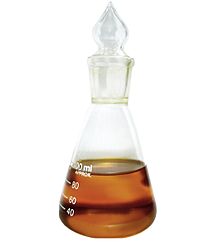植物油列表
| 植物油 |
|---|
 |
| 類型 |
| 用途 |
| 脂肪酸 |
植物油是自植物中萃取的脂肪與油類,依照提煉方式的不同,分為壓榨油、提煉油和香精油等三種油品。將欲榨取部位加壓,進而提取所得的植物油稱為「壓榨油」,其又分為「冷壓油」和「熱壓油」。在水或其他溶劑中,通過溶解植物的相關產油部位而得的油品,稱為「提煉油(萃取油)」,其油液可以與植物材料分離、再加以濃縮。植物油也可以採蒸餾方法自植物中萃取出芳香分子,稱為「精油」。相較油壓榨油和提煉油,精油普遍具有更多元的特性和用途。「浸泡油」則是經由浸軟程序,將所需植物部分放入植物油中浸泡、使底油吸收植物的各種養分製成。
植物油的制取方法分为三类。首先是压榨法,植物含油部位在压力的作用下产生压榨油。通过水或者其它溶剂萃取植物中的油脂以产生萃取油。压榨和萃取两者结合产生的粗油,经过蒸馏浓缩精制可产生精油。
尽管几乎所有的植物均含有不同程度的油脂,被广泛接受和使用的只有少数油料作物[1]。
食用油
[编辑]主要非熱帶植物食用油
[编辑]以下是在全球佔有極高食用比例的植物油品,亦皆可用作燃料油。
- 玉米油:又稱粟米油,為普遍的烹飪用油,香氣和口感較淡。[2]
- 棉籽油:用於生產洋芋片等零食食品[3],但是需要去除會破壞生育能力的棉酚。
- 橄欖油:用於烹飪、香妝品、香皂製造,也可作為傳統油燈的燃料。[4]
- 花生油:油質清澈,可用於沙拉調味,且由於煙點較高,常作油炸、煎炒用途。[5]
- 菜籽油:世界上最普遍的烹飪用油之一。[6]
- 紅花籽油:最早用作油漆塗料,現今主要用於烹飪。[7]
- 芝麻油:又稱麻油、香油,冷壓製成淡色食用油,熱壓則為深色、口感濃郁。[8]
- 大豆油:大豆粉加工製造的附產品。[9]
- 葵花油:最普遍的烹飪用油之一,亦用於生質柴油。[10]
- 大麻籽油
熱帶植物油
[编辑]和動物油一樣富含飽和脂肪,因此一般認為較不健康的植物油。
堅果油
[编辑]
堅果油帶有香氣,普遍用於烹飪。但由於油脂萃取不易,大多數堅果油的價格較為昂貴。
- 杏仁油:為食用油,但主要用於保養品和藥物治療[14]。
- 腰果油:稍似於橄欖油。可能有利於對抗齲齒。[15]
- 榛果油:帶香氣,為烹飪用油。由於微具收斂性,亦用於皮膚保養。[16][17]
- 澳洲胡桃油:或稱夏威夷堅果油,香氣濃郁,有高的发烟点[18]。不含反式脂肪。
- 碧根果油:由碧根果制成,作為一種食用油,但需要新鮮山核桃得到好的油質[19]。
- 松子油:作為一個美食烹飪油出售[20][21],有潛在的抑壓食慾的藥用价值[22]。
- 开心果油:帶有濃郁香氣的油和鮮明的綠色。[18]
- 核桃油:用其香味[18],也用於文藝復興畫家們的油畫。[23][24]
生物燃料用的油
[编辑]


許多植物油既能被用於生物燃料(生物柴油和植物油燃料),又能用於其他用途。其他油類僅用作生物燃料。[a][25]
雖然柴油發動機被發明的時候,部分地已經考慮到可以利用植物油作燃料,但是,柴油燃料幾乎是專門基於石油[26]。植物油作為生物燃料的評價标准为:
可作為生物燃料的多用途油
[编辑]下方列出的是所有的油(主要)都被用於其他用途 - 仅桐油是不可食用的 - 但人們已經考慮把它們作為生物燃料來使用。
- 蓖麻油,其成本低於很多候選的植物油。運動粘度可能是一個問題。[27]
- 椰子油(椰子核油),在生產椰子的地方,有希望在當地使用。[28]
- 菜籽油,來自芸苔,油茶(蘿蔔)是密切相關的油菜籽的油。這是一個在德國的生物柴油的主要來源[29]。
- 粟米油,有吸引力,因為玉米作為一種充足豐富的作物。
- 桐油,是適用於生物柴油的植物油[30]。在中國有多種因素从桐油生產生物柴油[31]。
非食用油僅用於或主要用於作為生物燃料
[编辑]這些油是從植物中提取的培養專為生產燃料油為基礎的生物燃料[b]。這些油,再加上上述的主要油類,比其他植物油作為燃料的油已收到更多的關注。
參考文獻
[编辑]- 脂肪與膽固醇:趕走壞油,搭上好油—你該吃什麼?營養學資源庫—哈佛大學公共衛生學院. www.hsph.harvard.edu. [2009-05-04]. (原始内容存档于2011-04-27) (英语).(Fats and Cholesterol: Out with the Bad, In with the Good - What Should You Eat? - The Nutrition Source - Harvard School of Public Health)
- 散裝油貿易. [2006-07-25]. (原始内容存档于2006-07-18) (英语).此網站對列表資料的詳盡與全面性貢獻良多。
- 荷美爾食品(Hormel Foods):其他油脂類烹飪指南. [2006-07-25]. (原始内容存档于2006-07-12) (英语).表列各種油類的煙點。
- 植物油的產量與特性. [2006-07-21]. (原始内容存档于2011-06-07) (英语).站內編列為數不少、詳盡的植物油相關資訊。
- Yokayo生質能源(Yokayo Biofuels):生質柴油歷史. [2011-02-25]. (原始内容存档于2010-07-16) (英语).提供有關生質柴油和其原料油的概論。Yokayo是自加州起家、販售生質柴油的企業。
- 蓖麻油. [2006-07-25]. (原始内容存档于2006-07-15) (英语).網站包含大量蓖麻油及其他油類的相關資料,尤其是用製生質柴油的油類。
- 印度共和國植物園(BGIR). 高產油植物資料庫 (PDF). 印度植物研究中心. 2004年4月5日 [2010-10-19]. (原始内容 (PDF)存档于2011年7月21日) (英语).表列約300種種植於印度的植物及其油產量,並附有印度語之油品名稱。
對健康的影響
[编辑]一些廠商會將植物油都氫化加工,以維持穩定性,氫化加工會增加飽和脂肪酸,而較為落後的加工方式則會產生比飽和脂肪更有害的反式脂肪;因此氫化植物油對健康不利,尤其是含反式脂肪的油脂,宜禁止人畜食用。[36]
註釋
[编辑]- ^ 乙醇 and, to a lesser degree, 甲醇和丁醇 are the other major types of 生物燃料。
- ^ There are some plants that yield a commercial vegetable oil, that are also used to make other sorts of biofuel. Eucalyptus, for example, has been explored as a means of biomass for producing ethanol. These plants are not listed here.
参考文献
[编辑]- ^ Economic Research Service. Oil Crops Outlook. United States Department of Agriculture. 1995–2006 [2013-02-09]. (原始内容存档于2018-11-05).This publication is available via email subscription.
- ^ Bulk Oil: Corn oil. [2006-07-24]. (原始内容存档于2020-11-24).
- ^ Bulk oil: Cottonseed oil. [2006-07-24]. (原始内容存档于2020-11-24).
- ^ Olive oil history. [2006-07-24]. (原始内容存档于2006-08-15).
- ^ Cook's encyclopedia: Peanut oil. [2006-07-24]. (原始内容存档于2006-07-04).
- ^ Canola Oil. [2006-07-24]. (原始内容存档于2021-03-08).
- ^ Bulk oil: safflower. [2006-07-24]. (原始内容存档于2020-11-24).
- ^ Bulk oil: sesame oil. [2006-07-24]. (原始内容存档于2020-11-24).
- ^ Southeast Farm Press: World soybean consumption quickens. [2006-07-31]. (原始内容存档于2006-06-05).
- ^ Bulk oil: Sunflower oil. [2006-07-24]. (原始内容存档于2020-11-24).
- ^ Cook's Encyclopedia: Palm oil/palm kernel oil. [2006-07-25]. (原始内容存档于2006-03-30).
- ^ Bulk oil: Palm oil. [2006-07-24]. (原始内容存档于2020-11-24).
- ^ Coconut-Info.com. [2006-07-24]. (原始内容存档于2014-05-17).
- ^ Bulk oil: Almond oil. [2006-07-24]. (原始内容存档于2020-11-24).
- ^ Science Service, Inc. Cashew oil may conquer cavities. Science News. March 23, 1991 [2011-02-26]. (原始内容存档于2012-05-27).
- ^ Cook's encyclopedia: Hazelnut oil. [2006-07-24]. (原始内容存档于2006-02-23).
- ^ Bulk Carrier and Vegetable Oils: Hazelnut oil. [2006-07-24]. (原始内容存档于2006-07-18).
- ^ 18.0 18.1 18.2 Simmons, Marie. Things Cooks Love. Andrews McMeel Publishing. 2008: 295. ISBN 0-7407-6976-6.
- ^ Storey, J. Benton. Pecans as a health food. Texas AgriLIFE Extension Service. [2011-10-24]. (原始内容存档于1999-02-20).
- ^ John Shi, Chi-Tang Ho, Fereidoon Shahidi eds. (编). Antioxidant Functional Factors in Nuts. Functional Foods of the East. May 15, 2010: 353 [2013-01-20]. ISBN 1-4200-7192-0. (原始内容存档于2016-05-13).
- ^ Daley, Regan. In the Sweet Kitchen: The Definitive Baker's Companion. Artisan Books. 2001: 159 [2013-01-20]. ISBN 1-57965-208-5. (原始内容存档于2016-05-12).
- ^ Yu Liangli; Slavin, Margaret. Nutraceutical Potential of Pine Nut. Cesarettin Alasalvar, Fereidoon Shahidi (编). Tree nuts: composition, phytochemicals, and health effects. CRC Press. 2008: 289 [2013-01-20]. ISBN 0-8493-3735-6. (原始内容存档于2016-05-17).
- ^ Powell, William F. Oil Painting Materials. Walter Foster. 1990: 43. ISBN 1-56010-056-7.
- ^ Gottsegen, Mark. Painter's Handbook. : 77. ISBN 0-8230-3496-8. (原始内容存档于2014-11-14).
- ^ Bio fuels. Castoroil.in. [2011-11-19]. (原始内容存档于2011-11-13).
- ^ Tebbutt, Jeff. An outline on Bio-diesel production and the fundamentals of Handling and car conversion (PDF). Bio Integrated Organic: 3. [2011-11-19]. (原始内容 (PDF)存档于2011-09-29).
- ^ Castor Oil as Biodiesel & Biofuel. CastorOil.in. [2011-10-24]. (原始内容存档于2011-11-13).
- ^ Cloin, Jan. Coconut Oil as a Biofuel in Pacific Islands–Challenges & Opportunities (PDF). South Pacific Applied Geoscience Commission. [2011-11-19]. (原始内容存档 (PDF)于2014-06-30).
- ^ Kraminska, N.; Teleto, О. The as the way to energy safety of the economy of the Ukraine (PDF). Sumy State University, Sumy, Ukraine. [2011-11-19]. (原始内容存档 (PDF)于2018-05-14).
- ^ Journey to Forever: Bio-diesel Yield. [2011-10-24]. (原始内容存档于2011-06-07).
- ^ Farago, Robert. China Builds Tung Tree Oil Biodiesel Plants. The Truth about Cars. July 15, 2008 [2011-11-19]. (原始内容存档于2019-06-26).
- ^ Kanter, James. Air New Zealand Flies on Engine With Jatropha Biofuel Blend. New York Times. 2011-12-30 [2013-01-20]. (原始内容存档于2009-09-24).
- ^ Pramanik, K. Properties and use of jatropha curcas oil and diesel fuel blends in compression ignition engine. Renewable Energy. February 2003, 28 (2): 239–248 [2011-10-24]. doi:10.1016/S0960-1481(02)00027-7. (原始内容存档于2015-09-24).
- ^ Duke Handbook, "Euphorbia tirucalli (页面存档备份,存于互联网档案馆)
- ^ Salunkhe, p 522 (页面存档备份,存于互联网档案馆)
- ^ 食物安全中心 - 風險評估研究報告書 - 揭露含反式脂肪的熱門食品. [2007-10-15]. (原始内容存档于2020-04-22).
